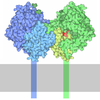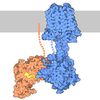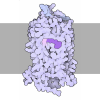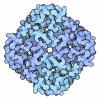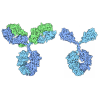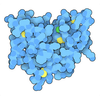+ データを開く
データを開く
- 基本情報
基本情報
| 登録情報 | データベース: PDB / ID: 6p9x | ||||||||||||||||||
|---|---|---|---|---|---|---|---|---|---|---|---|---|---|---|---|---|---|---|---|
| タイトル | CRF1 Receptor Gs GPCR protein complex with CRF1 peptide | ||||||||||||||||||
 要素 要素 |
| ||||||||||||||||||
 キーワード キーワード | MEMBRANE PROTEIN / GPCR | ||||||||||||||||||
| 機能・相同性 |  機能・相同性情報 機能・相同性情報corticotropin-releasing hormone activity / positive regulation of digestive system process / positive regulation of corticosterone secretion / : / corticotropin-releasing hormone binding / positive regulation of circadian sleep/wake cycle, wakefulness / negative regulation of circadian sleep/wake cycle, REM sleep / regulation of corticosterone secretion / corticotrophin-releasing factor receptor activity / corticotropin-releasing hormone receptor 2 binding ...corticotropin-releasing hormone activity / positive regulation of digestive system process / positive regulation of corticosterone secretion / : / corticotropin-releasing hormone binding / positive regulation of circadian sleep/wake cycle, wakefulness / negative regulation of circadian sleep/wake cycle, REM sleep / regulation of corticosterone secretion / corticotrophin-releasing factor receptor activity / corticotropin-releasing hormone receptor 2 binding / corticotropin secretion / negative regulation of glucagon secretion / positive regulation of corticotropin secretion / positive regulation of cortisol secretion / regulation of serotonin secretion / MECP2 regulates transcription of neuronal ligands / general adaptation syndrome, behavioral process / positive regulation of behavioral fear response / cellular response to corticotropin-releasing hormone stimulus / glucocorticoid biosynthetic process / negative regulation of norepinephrine secretion / parturition / hormone-mediated apoptotic signaling pathway / negative regulation of luteinizing hormone secretion / monoatomic ion homeostasis / negative regulation of epinephrine secretion / varicosity / negative regulation of voltage-gated calcium channel activity / behavioral response to ethanol / positive regulation of cAMP-mediated signaling / fear response / response to ether / corticotropin-releasing hormone receptor 1 binding / neuropeptide hormone activity / synaptic transmission, dopaminergic / G protein-coupled peptide receptor activity / negative regulation of systemic arterial blood pressure / Class B/2 (Secretin family receptors) / regulation of NMDA receptor activity / cellular response to cocaine / diterpenoid metabolic process / exploration behavior / adrenal gland development / response to corticosterone / response to aldosterone / activation of adenylate cyclase activity / hypothalamus development / response to pain / positive regulation of calcium ion import / positive regulation of insulin secretion involved in cellular response to glucose stimulus / locomotory exploration behavior / associative learning / response to immobilization stress / cellular response to dexamethasone stimulus / female pregnancy / long-term synaptic potentiation / adenylate cyclase-activating G protein-coupled receptor signaling pathway / lung development / Olfactory Signaling Pathway / Activation of the phototransduction cascade / hormone activity / Prostacyclin signalling through prostacyclin receptor / G beta:gamma signalling through PLC beta / Presynaptic function of Kainate receptors / Thromboxane signalling through TP receptor / Glucagon signaling in metabolic regulation / G protein-coupled acetylcholine receptor signaling pathway / G-protein activation / Activation of G protein gated Potassium channels / Inhibition of voltage gated Ca2+ channels via Gbeta/gamma subunits / G beta:gamma signalling through CDC42 / Vasopressin regulates renal water homeostasis via Aquaporins / G beta:gamma signalling through BTK / ADP signalling through P2Y purinoceptor 12 / Synthesis, secretion, and inactivation of Glucagon-like Peptide-1 (GLP-1) / Glucagon-type ligand receptors / Sensory perception of sweet, bitter, and umami (glutamate) taste / photoreceptor disc membrane / G alpha (z) signalling events / Adrenaline,noradrenaline inhibits insulin secretion / Glucagon-like Peptide-1 (GLP1) regulates insulin secretion / ADORA2B mediated anti-inflammatory cytokines production / response to estrogen / cellular response to catecholamine stimulus / sensory perception of taste / ADP signalling through P2Y purinoceptor 1 / adenylate cyclase-activating dopamine receptor signaling pathway / G beta:gamma signalling through PI3Kgamma / GPER1 signaling / Cooperation of PDCL (PhLP1) and TRiC/CCT in G-protein beta folding / cellular response to prostaglandin E stimulus / Inactivation, recovery and regulation of the phototransduction cascade / G-protein beta-subunit binding / heterotrimeric G-protein complex / G alpha (12/13) signalling events / extracellular vesicle / signaling receptor complex adaptor activity / Thrombin signalling through proteinase activated receptors (PARs) / GTPase binding / retina development in camera-type eye 類似検索 - 分子機能 | ||||||||||||||||||
| 生物種 |  Homo sapiens (ヒト) Homo sapiens (ヒト) | ||||||||||||||||||
| 手法 | 電子顕微鏡法 / 単粒子再構成法 / クライオ電子顕微鏡法 / 解像度: 2.91 Å | ||||||||||||||||||
 データ登録者 データ登録者 | Belousoff, M.J. / Liang, Y.L. / Sexton, P. / Danev, R. | ||||||||||||||||||
| 資金援助 |  オーストラリア, オーストラリア,  日本, 5件 日本, 5件
| ||||||||||||||||||
 引用 引用 |  ジャーナル: Mol Cell / 年: 2020 ジャーナル: Mol Cell / 年: 2020タイトル: Toward a Structural Understanding of Class B GPCR Peptide Binding and Activation. 著者: Yi-Lynn Liang / Matthew J Belousoff / Peishen Zhao / Cassandra Koole / Madeleine M Fletcher / Tin T Truong / Villy Julita / George Christopoulos / H Eric Xu / Yan Zhang / Maryam Khoshouei / ...著者: Yi-Lynn Liang / Matthew J Belousoff / Peishen Zhao / Cassandra Koole / Madeleine M Fletcher / Tin T Truong / Villy Julita / George Christopoulos / H Eric Xu / Yan Zhang / Maryam Khoshouei / Arthur Christopoulos / Radostin Danev / Patrick M Sexton / Denise Wootten /      要旨: Class B G protein-coupled receptors (GPCRs) are important therapeutic targets for major diseases. Here, we present structures of peptide and Gs-bound pituitary adenylate cyclase-activating peptide, ...Class B G protein-coupled receptors (GPCRs) are important therapeutic targets for major diseases. Here, we present structures of peptide and Gs-bound pituitary adenylate cyclase-activating peptide, PAC1 receptor, and corticotropin-releasing factor (CRF), (CRF1) receptor. Together with recently solved structures, these provide coverage of the major class B GPCR subfamilies. Diverse orientations of the extracellular domain to the receptor core in different receptors are at least partially dependent on evolutionary conservation in the structure and nature of peptide interactions. Differences in peptide interactions to the receptor core also influence the interlinked TM2-TM1-TM6/ECL3/TM7 domain, and this is likely important in their diverse signaling. However, common conformational reorganization of ECL2, linked to reorganization of ICL2, modulates G protein contacts. Comparison between receptors reveals ICL2 as a key domain forming dynamic G protein interactions in a receptor- and ligand-specific manner. This work advances our understanding of class B GPCR activation and Gs coupling. | ||||||||||||||||||
| 履歴 |
|
- 構造の表示
構造の表示
| ムービー |
 ムービービューア ムービービューア |
|---|---|
| 構造ビューア | 分子:  Molmil Molmil Jmol/JSmol Jmol/JSmol |
- ダウンロードとリンク
ダウンロードとリンク
- ダウンロード
ダウンロード
| PDBx/mmCIF形式 |  6p9x.cif.gz 6p9x.cif.gz | 203.1 KB | 表示 |  PDBx/mmCIF形式 PDBx/mmCIF形式 |
|---|---|---|---|---|
| PDB形式 |  pdb6p9x.ent.gz pdb6p9x.ent.gz | 152.9 KB | 表示 |  PDB形式 PDB形式 |
| PDBx/mmJSON形式 |  6p9x.json.gz 6p9x.json.gz | ツリー表示 |  PDBx/mmJSON形式 PDBx/mmJSON形式 | |
| その他 |  その他のダウンロード その他のダウンロード |
-検証レポート
| 文書・要旨 |  6p9x_validation.pdf.gz 6p9x_validation.pdf.gz | 1.1 MB | 表示 |  wwPDB検証レポート wwPDB検証レポート |
|---|---|---|---|---|
| 文書・詳細版 |  6p9x_full_validation.pdf.gz 6p9x_full_validation.pdf.gz | 1.1 MB | 表示 | |
| XML形式データ |  6p9x_validation.xml.gz 6p9x_validation.xml.gz | 36.6 KB | 表示 | |
| CIF形式データ |  6p9x_validation.cif.gz 6p9x_validation.cif.gz | 56.8 KB | 表示 | |
| アーカイブディレクトリ |  https://data.pdbj.org/pub/pdb/validation_reports/p9/6p9x https://data.pdbj.org/pub/pdb/validation_reports/p9/6p9x ftp://data.pdbj.org/pub/pdb/validation_reports/p9/6p9x ftp://data.pdbj.org/pub/pdb/validation_reports/p9/6p9x | HTTPS FTP |
-関連構造データ
| 関連構造データ |  20277MC  0993C  6p9yC M: このデータのモデリングに利用したマップデータ C: 同じ文献を引用 ( |
|---|---|
| 類似構造データ | |
| 電子顕微鏡画像生データ |  EMPIAR-10361 (タイトル: Cryo-EM of CRF1 receptor bound to CRF and Gs protein EMPIAR-10361 (タイトル: Cryo-EM of CRF1 receptor bound to CRF and Gs proteinData size: 2.6 TB Data #1: Unaligned multi-frame gain-normalized movies in LZW compressed TIFF format [micrographs - multiframe]) |
- リンク
リンク
- 集合体
集合体
| 登録構造単位 | 
|
|---|---|
| 1 |
|
- 要素
要素
-Guanine nucleotide-binding protein ... , 3種, 3分子 ABG
| #1: タンパク質 | 分子量: 45700.418 Da / 分子数: 1 / 由来タイプ: 組換発現 / 由来: (組換発現)  Homo sapiens (ヒト) / 遺伝子: GNAS, GNAS1, GSP / 発現宿主: Homo sapiens (ヒト) / 遺伝子: GNAS, GNAS1, GSP / 発現宿主:  Trichoplusia ni (イラクサキンウワバ) / 参照: UniProt: P63092 Trichoplusia ni (イラクサキンウワバ) / 参照: UniProt: P63092 |
|---|---|
| #2: タンパク質 | 分子量: 38534.062 Da / 分子数: 1 / 由来タイプ: 組換発現 / 由来: (組換発現)  Homo sapiens (ヒト) / 遺伝子: GNB1 / 発現宿主: Homo sapiens (ヒト) / 遺伝子: GNB1 / 発現宿主:  Trichoplusia ni (イラクサキンウワバ) / 参照: UniProt: P62873 Trichoplusia ni (イラクサキンウワバ) / 参照: UniProt: P62873 |
| #3: タンパク質 | 分子量: 7861.143 Da / 分子数: 1 / 由来タイプ: 組換発現 / 由来: (組換発現)  Homo sapiens (ヒト) / 遺伝子: GNG2 / 発現宿主: Homo sapiens (ヒト) / 遺伝子: GNG2 / 発現宿主:  Trichoplusia ni (イラクサキンウワバ) / 参照: UniProt: P59768 Trichoplusia ni (イラクサキンウワバ) / 参照: UniProt: P59768 |
-抗体 / タンパク質 / タンパク質・ペプチド / 非ポリマー , 4種, 20分子 NRP

| #4: 抗体 | 分子量: 15140.742 Da / 分子数: 1 / 由来タイプ: 組換発現 / 由来: (組換発現)   |
|---|---|
| #5: タンパク質 | 分子量: 49392.109 Da / 分子数: 1 / 由来タイプ: 組換発現 / 由来: (組換発現)  Homo sapiens (ヒト) / 遺伝子: CRHR1, CRFR, CRFR1, CRHR / 発現宿主: Homo sapiens (ヒト) / 遺伝子: CRHR1, CRFR, CRFR1, CRHR / 発現宿主:  Trichoplusia ni (イラクサキンウワバ) / 参照: UniProt: P34998 Trichoplusia ni (イラクサキンウワバ) / 参照: UniProt: P34998 |
| #6: タンパク質・ペプチド | 分子量: 4764.481 Da / 分子数: 1 / 由来タイプ: 合成 / 由来: (合成)  Homo sapiens (ヒト) / 参照: UniProt: P06850 Homo sapiens (ヒト) / 参照: UniProt: P06850 |
| #7: 水 | ChemComp-HOH / |
-詳細
| Has protein modification | Y |
|---|
-実験情報
-実験
| 実験 | 手法: 電子顕微鏡法 |
|---|---|
| EM実験 | 試料の集合状態: PARTICLE / 3次元再構成法: 単粒子再構成法 |
- 試料調製
試料調製
| 構成要素 |
| ||||||||||||||||||||||||||||||
|---|---|---|---|---|---|---|---|---|---|---|---|---|---|---|---|---|---|---|---|---|---|---|---|---|---|---|---|---|---|---|---|
| 分子量 | 実験値: NO | ||||||||||||||||||||||||||||||
| 由来(天然) |
| ||||||||||||||||||||||||||||||
| 由来(組換発現) |
| ||||||||||||||||||||||||||||||
| 緩衝液 | pH: 7.4 | ||||||||||||||||||||||||||||||
| 試料 | 包埋: NO / シャドウイング: NO / 染色: NO / 凍結: YES | ||||||||||||||||||||||||||||||
| 急速凍結 | 凍結剤: ETHANE |
- 電子顕微鏡撮影
電子顕微鏡撮影
| 実験機器 |  モデル: Titan Krios / 画像提供: FEI Company |
|---|---|
| 顕微鏡 | モデル: FEI TITAN KRIOS |
| 電子銃 | 電子線源:  FIELD EMISSION GUN / 加速電圧: 300 kV / 照射モード: SPOT SCAN FIELD EMISSION GUN / 加速電圧: 300 kV / 照射モード: SPOT SCAN |
| 電子レンズ | モード: BRIGHT FIELD / Cs: 2.7 mm |
| 撮影 | 平均露光時間: 3.7 sec. / 電子線照射量: 1 e/Å2 / フィルム・検出器のモデル: GATAN K3 (6k x 4k) / 撮影したグリッド数: 1 |
- 解析
解析
| ソフトウェア | 名称: PHENIX / バージョン: 1.15.2_3472: / 分類: 精密化 | ||||||||||||||||||||||||
|---|---|---|---|---|---|---|---|---|---|---|---|---|---|---|---|---|---|---|---|---|---|---|---|---|---|
| CTF補正 | タイプ: PHASE FLIPPING AND AMPLITUDE CORRECTION | ||||||||||||||||||||||||
| 対称性 | 点対称性: C1 (非対称) | ||||||||||||||||||||||||
| 3次元再構成 | 解像度: 2.91 Å / 解像度の算出法: FSC 0.143 CUT-OFF / 粒子像の数: 516000 / 対称性のタイプ: POINT | ||||||||||||||||||||||||
| 拘束条件 |
|
 ムービー
ムービー コントローラー
コントローラー






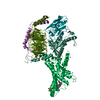
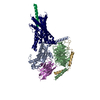

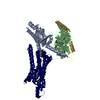
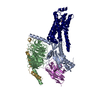
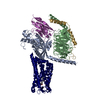



 PDBj
PDBj


